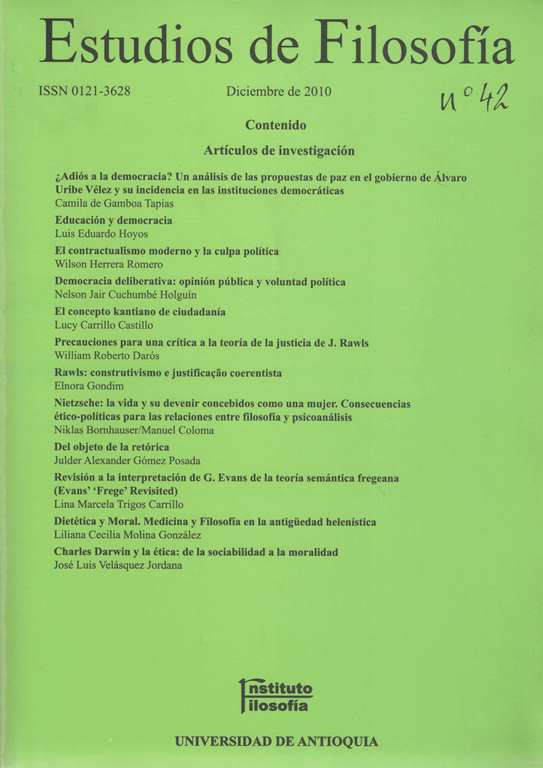Charles Darwin and Ethics: From Sociability to Morality
DOI:
https://doi.org/10.17533/udea.ef.11591Keywords:
Charles Darwin, dignity, golden rule, human animals, Hume, moral conscience, moral sense, natural selection, simpathyAbstract
Charles Darwin´s most important contribution to Moral Philosophy is an explanation of the origin and development of the moral condition of the human being exclusively from the perspective of Natural History. Starting with the publication of The Descent of Man, in 1871, this statement has aroused strong controversies, to the point of becoming a criterion with which to distinguish the traditional conceptions of Morality from the modern conceptions of Morality. This essay is an articulated description of the structure of Morality according to Charles Darwin, considering three aspects of Moral Conscience: The evolutionary origin and the evolutionary stages of its development, the emotional or sentimental basis of Morality with special attention to the feeling of Sympathy, and the normative dimension inspired by Kantian and Utilitarian traditions. The main conclusion established here is that the sociability of human beings is a necessary but not sufficient condition of Morality. In addition to this, some difficulties found in the statement of Darwin when he tried to reconcile the two moral traditions mentioned are gathered.
Downloads
References
AYALA, F., & Cela Conde, C. J. (2007). Human Evolution. Trails from the Past. Oxford: Oxford University Press.
BONIOLO, G. (2006). The Descent of Instict and the Ascent of Ethics. En G. Boniolo, & G. D. Anna (Edits.), Evolution Ethics and Contemporary Biology (págs. 27-40). Cambridge: Cambridge University Press. DOI: https://doi.org/10.1017/CBO9780511498428.004
CELA CONDE, C. J. (1985). De genes, dioses y tiranos. Madrid: Alianza Editorial.
CELA CONDE, C. J. (1989). El naturalismo contemporáneo. En V. Camps (Ed.), Historia de la ética (págs. 601-634). Barcelona: Crítica.
DARWIN, C. (1998). The Descent of Man. New York: Prometeus.
KORSGAARD, C. (s.f.). Moral Animals. That short but imperious word ought: . Recuperado el 5 de julio de 2010, de http://www.people.fas.harvard.edu/~korsgaar/CMK.MA2.pdf
LEWENS, T. (2007). Darwin. London: Routledge. DOI: https://doi.org/10.4324/9780203597132
MIDGLEY, M. (1993). The Origins of Ethics. En P. Singer (Ed.), A Companion to Ethics (págs. 3-13). Great Bretain: Blackwell.
RACHELS, J. (1990). Created from animals. Oxford: Oxford University Press. DOI: https://doi.org/10.1093/oso/9780192177759.001.0001
RICHARDS, R. (1984). Darwin and the Emergence of Evolution Theories of Mind and Behaviour (7a ed.). Chicago-Londres: Chicago University Press.
Downloads
Published
How to Cite
Issue
Section
Categories
License
Copyright (c) 2010 José Luis Velázquez Jordana

This work is licensed under a Creative Commons Attribution-NonCommercial-ShareAlike 4.0 International License.
Authors who publish with this journal agree to the following terms:
1. The Author retains copyright in the Work, where the term "Work" shall include all digital objects that may result in subsequent electronic publication or distribution.
2. Upon acceptance of the Work, the author shall grant to the Publisher the right of first publication of the Work.
3. The Author shall grant to the Publisher a nonexclusive perpetual right and license to publish, archive, and make accessible the Work in whole or in part in all forms of media now or hereafter known under a Creative Commons Attribution-NoCommercia-ShareAlike (CC BY-NC-SA 4.0), or its equivalent, which, for the avoidance of doubt, allows others to copy, distribute, and transmit the Work under the following conditions: (a) Attribution: Other users must attribute the Work in the manner specified by the author as indicated on the journal Web site;(b) Noncommercial: Other users (including Publisher) may not use this Work for commercial purposes;
4. The Author is able to enter into separate, additional contractual arrangements for the nonexclusive distribution of the journal's published version of the Work (e.g., post it to an institutional repository or publish it in a book), as long as there is provided in the document an acknowledgement of its initial publication in this journal;
5. Authors are permitted, and Estudios de Filosofía promotes, to post online the preprint manuscript of the Work in institutional repositories or on their Websites prior to and during the submission process, as it can lead to productive exchanges, as well as earlier and greater citation of published work (see The Effect of Open Access). Any such posting made before acceptance and publication of the Work is expected be updated upon publication to include a reference to the Estudios de Filosofía's assigned URL to the Article and its final published version in Estudios de Filosofía.















